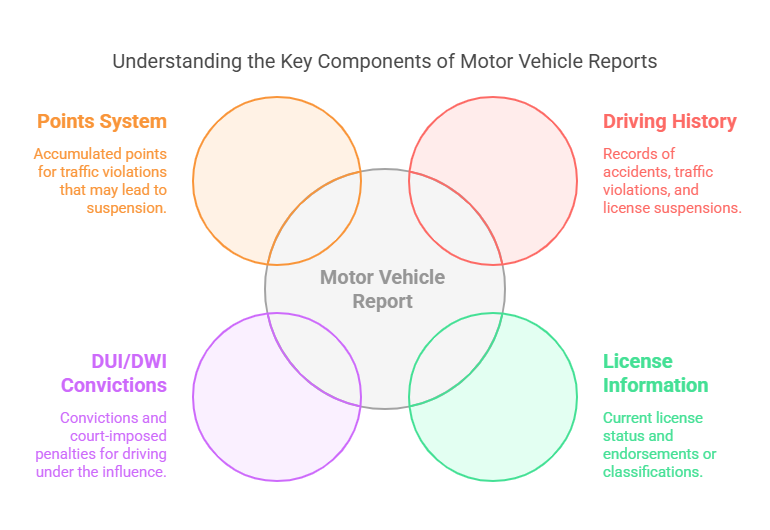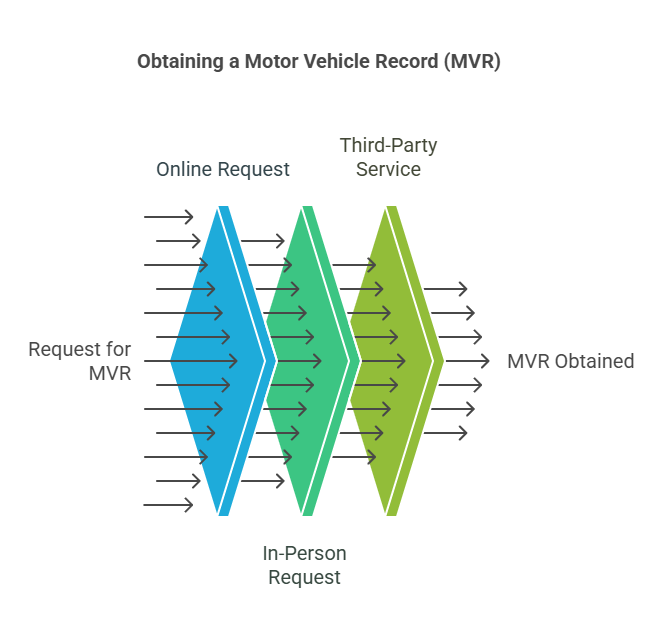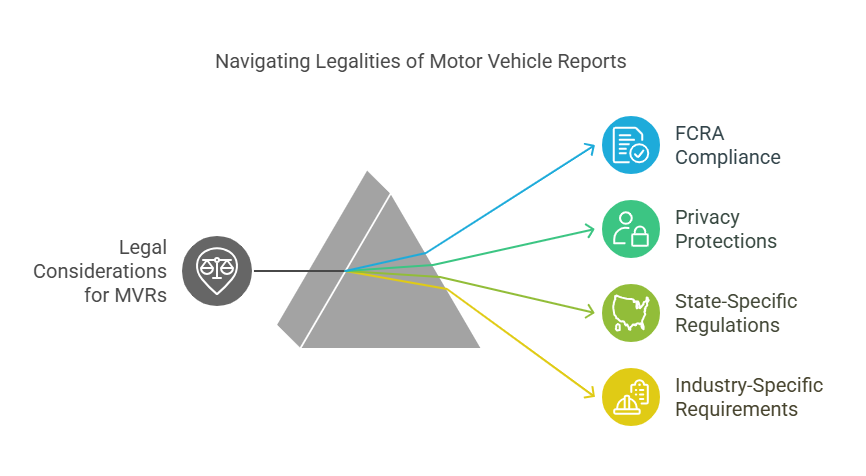Motor Vehicle Reports: A Comprehensive Overview

Understanding Motor Vehicle Reports (MVRs)
Motor Vehicle Reports (MVR) is a detailed document that provides an overview of an individual’s driving history. It is issued by the Department of Motor Vehicles (DMV) or equivalent agencies and plays a crucial role in assessing a person’s driving behavior. MVRs are essential tools used by employers, insurance companies, and individuals to evaluate driving records for various purposes, including employment, insurance underwriting, and personal record-keeping.
Understanding and maintaining a clean MVR is important, as it can significantly impact your job prospects, insurance rates, and even your ability to hold certain licenses. Employers rely on MVRs to ensure safe driving practices, while insurance providers use them to assess risk and calculate premiums.
What Information Does an MVR Contain?

A Motor Vehicle Report includes a comprehensive record of your driving history. Key components typically found in an MVR are:
- Driving History:
- Records of accidents, including at-fault and not-at-fault incidents (if reported to the DMV).
- Traffic violations, such as speeding tickets, running red lights, or reckless driving.
- License suspensions or revocations due to violations or failure to comply with legal requirements.
- License Information:
- Current license status (valid, expired, suspended, or revoked).
- Endorsements and classifications, such as commercial driver’s licenses (CDLs) or motorcycle endorsements.
- DUI/DWI Convictions:
- Any convictions for driving under the influence of drugs or alcohol.
- Notes on court-imposed penalties or mandatory courses, if applicable.
- Points System (varies by state):
- Accumulated points for traffic violations, which can lead to license suspension if the threshold is exceeded.
Each state may include slightly different information on its MVR based on local laws and regulations.
Who Uses Motor Vehicle Reports and Why?
Several entities and individuals rely on MVRs for various reasons:
- Employers:
- Companies hiring for roles involving driving (e.g., delivery drivers, commercial truck operators) use MVRs to assess candidates’ driving records.
- Ensures that employees meet safety and compliance standards, reducing the risk of liability for accidents.
- Insurance Companies:
- Insurers review MVRs to evaluate risk and determine auto insurance premiums.
- Drivers with clean records may qualify for lower rates, while those with violations or accidents may face higher costs.
- Individuals:
- Individuals can request their own MVR to ensure its accuracy and address any errors.
- Reviewing your MVR is particularly important if you are applying for a job or negotiating insurance rates.
How Is an MVR Obtained?

Obtaining an MVR is a straightforward process, though the exact steps and costs may vary by state. Here’s how you can obtain one:
- Online Requests:
- Many DMVs allow individuals to request their MVR online. You may need to provide identifying information such as your driver’s license number and personal details.
- In-Person at the DMV:
- Visit your local DMV office to request your MVR. Bring a valid ID and be prepared to pay a small fee, which typically ranges from $5 to $25 depending on your state.
- Third-Party Services:
- Employers or individuals can use third-party background check companies to obtain MVRs. These services often streamline the process and ensure compliance with legal requirements.
Cost and Processing Times:
- The cost of obtaining an MVR varies by state and method. Online requests are usually processed faster, often within minutes, while in-person or mailed requests may take several days.
The Role of MVRs in Employment and Insurance
Why Employers Check Motor Vehicle Reports
Employers, particularly those in industries involving driving, rely heavily on Motor Vehicle Reports (MVRs) to make informed hiring decisions. For roles such as delivery drivers, truck operators, and rideshare drivers, having a clean driving record is crucial. Here are some reasons employers conduct MVR checks:
- Ensuring Workplace Safety:
Employers prioritize the safety of their employees and the public. Reviewing an applicant’s driving history helps employers identify risky drivers who could pose a safety threat on the road. - Minimizing Liability:
Hiring a driver with a poor MVR increases the risk of accidents, which can result in lawsuits, increased insurance premiums, and reputational damage. Conducting MVR checks reduces liability by ensuring only qualified and responsible drivers are hired. - Compliance with Regulations:
Certain industries, such as transportation and logistics, are regulated by federal or state laws that mandate MVR checks. For instance, the Department of Transportation (DOT) requires employers to verify the driving history of commercial vehicle operators. - Evaluating Reliability:
An MVR can reflect an individual’s overall reliability and responsibility. For example, frequent traffic violations or DUIs may indicate a pattern of poor decision-making that could extend to other areas of their work.
Impact of MVRs on Insurance Premiums
Insurance companies use MVRs to assess risk and determine auto insurance premiums. A driver’s record plays a significant role in the underwriting process, influencing whether they are deemed a low-risk or high-risk policyholder.
Here’s how MVRs impact insurance premiums:
- Clean Record = Lower Rates:
Drivers with no accidents or violations typically enjoy lower insurance premiums, as they pose less risk to insurers. - Violations = Higher Costs:
Traffic violations, such as speeding tickets or reckless driving, result in higher premiums. Insurers may apply surcharges or reclassify the driver as high risk. - DUIs and Serious Offenses:
Convictions for driving under the influence (DUI) or driving while intoxicated (DWI) can drastically increase insurance premiums or even lead to policy cancellation.
The following table provides an overview of common violations and their potential impact on insurance rates:
| Violation | Impact on Premiums | Duration on Record |
|---|---|---|
| Speeding Ticket | 10%–20% increase | 3–5 years |
| At-Fault Accident | 20%–40% increase | 3–7 years |
| DUI/DWI Conviction | 50%–200% increase | 10+ years |
| Reckless Driving | 25%–50% increase | 3–5 years |
| License Suspension | Up to 100% increase | 5–7 years |
How Exact Background Checks Can Help
Exact Background Checks offers comprehensive MVR screening services designed to meet the needs of employers and organizations. Their solutions ensure accuracy, compliance, and efficiency in the hiring process.
Key services provided by Exact Background Checks include:
- Comprehensive MVR Reports:
Employers receive detailed driving records that include traffic violations, accidents, license status, and more. - Customizable Screening Solutions:
Tailored reports can be configured to meet the specific needs of the employer or industry, whether it’s for commercial drivers, delivery services, or rideshare platforms. - Compliance with Regulations:
The company adheres to all legal requirements, including the Fair Credit Reporting Act (FCRA), ensuring that reports are obtained and used lawfully. - Streamlined Processes:
Exact Background Checks simplifies the MVR request process, providing fast and reliable results.
For employers seeking to maintain a safe and efficient workforce, Exact Background Checks is a trusted partner in navigating the complexities of MVR screening.
Interpreting an MVR
Reading and interpreting an MVR can seem daunting, especially for individuals unfamiliar with the terminology. Here’s a guide to understanding the key components of an MVR:
- License Status:
Verify whether the license is active, suspended, or revoked. Suspensions and revocations are red flags for employers and insurers. - Violations and Convictions:
Review any listed traffic violations, noting the type (e.g., speeding, DUI) and date. Recent violations carry more weight than older ones. - Accidents:
Check for records of accidents, particularly those marked as at-fault. Employers and insurers may view frequent accidents as an indicator of risky driving behavior. - Point Accumulation:
In states with a point system, look for the total points accumulated. Excessive points can lead to license suspension.
Red Flags on an MVR:
- Multiple traffic violations within a short period.
- DUI or DWI convictions.
- License suspensions or revocations.
- At-fault accidents resulting in significant damage or injury.
Understanding these elements is essential for employers making hiring decisions and individuals working to maintain a clean driving record.
Legal Considerations for Motor Vehicle Reports (MVRs)

Accessing and using Motor Vehicle Reports (MVRs) involves several legal requirements and protections. Employers, insurers, and individuals must adhere to applicable laws to ensure compliance and protect privacy. Below are key legal considerations related to MVRs:
1. Compliance with the Fair Credit Reporting Act (FCRA):
The FCRA governs how MVRs are obtained and used for employment purposes. Employers must:
- Obtain Written Consent: Employers are required to secure written permission from the applicant or employee before running an MVR check.
- Provide Pre-Adverse Action Notices: If adverse action (e.g., not hiring) is based on MVR results, employers must notify the individual and provide them with a copy of the MVR report.
- Offer an Opportunity to Dispute: The individual has the right to dispute any inaccuracies in the report before final decisions are made.
2. Privacy Protections and Driver’s Rights:
Access to MVRs is regulated to protect individual privacy. Unauthorized use or disclosure of MVR information is prohibited. For example:
- MVRs cannot be obtained without a permissible purpose, such as employment screening or insurance underwriting.
- States may have additional privacy laws that restrict access or limit the information provided in MVRs.
3. State-Specific Regulations:
MVR content and availability vary by state. Some states use a point-based system for tracking traffic violations, while others report violations differently. Employers and insurers must understand state-specific rules to ensure compliance.
4. Industry-Specific Requirements:
Certain industries, like transportation and logistics, must comply with additional federal and state regulations. For example:
- The Department of Transportation (DOT) requires annual MVR checks for commercial drivers.
- Employers must maintain MVR records for DOT-regulated positions for a specified period.
Failure to comply with these legal requirements can lead to penalties, lawsuits, and reputational damage.
FAQs About Motor Vehicle Reports
What information is included in an MVR check?
An MVR check provides detailed information about an individual's driving history, including:
- License status (valid, suspended, revoked).
- Traffic violations (e.g., speeding tickets, reckless driving).
- DUI/DWI offenses.
- Accident history (whether the individual was at fault).
- Special endorsements or restrictions (e.g., CDL, corrective lenses).
How often should employers conduct MVR checks?
Employers should conduct MVR checks at two critical points:
- Before hiring candidates for driving-related positions.
- Annually or biannually to monitor the driving records of current employees who operate company vehicles.
Regular monitoring helps ensure that employees maintain safe driving practices over time.
Are MVR checks mandatory for all employees?
MVR checks are not mandatory for all employees. They are most relevant for employees whose jobs require driving, especially those operating company vehicles. Examples include delivery drivers, sales representatives, and truck drivers. For non-driving roles, MVR checks may not be necessary unless driving is occasionally required.
Can employers perform MVR checks themselves?
Employers can request MVR reports directly from state Departments of Motor Vehicles (DMVs). However, many businesses choose to partner with background check providers to streamline the process, ensure compliance, and receive more comprehensive reports. Using a reliable service like Exact Background Checks saves time and reduces the risk of errors.
What are the consequences of hiring without an MVR check?
Hiring without an MVR check can lead to significant consequences, including:
- Increased risk of accidents: Hiring individuals with unsafe driving records can lead to accidents, injuries, and potential legal liabilities.
- Legal consequences: Employers could be held accountable for negligent hiring if an employee with a poor driving history causes an accident.
- Higher insurance costs: Hiring high-risk drivers can result in increased commercial vehicle insurance premiums or even a loss of coverage.
Conclusion
Motor Vehicle Reports (MVRs) play a critical role in employment, insurance, and personal record-keeping. These reports provide a detailed snapshot of a person’s driving history, including violations, accidents, and license status.
For employers, MVRs are essential for making informed hiring decisions, promoting workplace safety, and reducing liability. Insurers rely on MVRs to assess risk and set premiums, while individuals can use them to monitor their records and address errors proactively.
Exact Background Checks simplifies the process of obtaining accurate, reliable MVRs. Their comprehensive screening solutions help employers navigate the complexities of background checks while ensuring compliance with legal requirements.
Key takeaways:
- MVRs do not only reflect driving performance but can also impact career and insurance prospects.
- Understanding the legal requirements and limitations of MVRs is crucial for employers and individuals.
- Regularly checking your MVR ensures that you are aware of your driving history and can address any discrepancies.
By staying informed and leveraging services like Exact Background Checks, individuals and organizations can make better decisions regarding driving records and their implications.




Great article! MVRs are indeed crucial for ensuring safety and compliance, especially in hiring drivers.